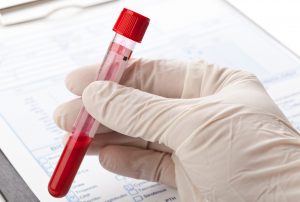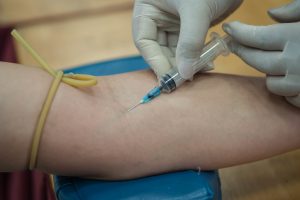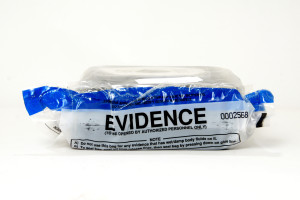 Police officers in Georgia are being trained to draw blood from drivers suspected of DUI (called ‘OVI’ in Ohio). Typically, a person arrested for OVI in Ohio is taken to a police station for a breath test or urine test. Occasionally, an OVI suspect is taken to a hospital for a blood test. In Georgia, DUI suspects will now have their blood drawn by police officers. Could we soon have police officers drawing blood from OVI suspects in Ohio?
Police officers in Georgia are being trained to draw blood from drivers suspected of DUI (called ‘OVI’ in Ohio). Typically, a person arrested for OVI in Ohio is taken to a police station for a breath test or urine test. Occasionally, an OVI suspect is taken to a hospital for a blood test. In Georgia, DUI suspects will now have their blood drawn by police officers. Could we soon have police officers drawing blood from OVI suspects in Ohio?
Articles Tagged with Blood Testing
Ohio Court Interprets Recent Supreme Court Decision For DUI/OVI Cases
 Over the past couple of years, this blog has followed and discussed the United States Supreme Court’s decision in Mitchell v. Wisconsion. While Supreme Court decisions can seem like seismic shifts in the law when they are issued, the reality is it often takes time for their effects to be felt on a practical level. Such is the case with Mitchell. While it was decided over a year-and-a-half ago, it is just now being discussed by Ohio Appellate Courts.
Over the past couple of years, this blog has followed and discussed the United States Supreme Court’s decision in Mitchell v. Wisconsion. While Supreme Court decisions can seem like seismic shifts in the law when they are issued, the reality is it often takes time for their effects to be felt on a practical level. Such is the case with Mitchell. While it was decided over a year-and-a-half ago, it is just now being discussed by Ohio Appellate Courts.
U.S. Supreme Court Delivers Disappointing DUI Decision
As discusse d previously in this space, we have been eagerly awaiting the Supreme Court’s decision in Mitchell v. Wisconsin. The Court set out to determine whether Wisconsin’s Implied Consent statute requires police to obtain a search warrant before getting a blood sample from an unconscious DUI suspect. The state of Wisconsin argued that Mitchell, through the state’s Implied Consent statute, had already consented to the blood draw, thereby removing the requirement for a warrant. Alternatively, they argued this should simply be viewed as an exercise of the State’s power to imposes conditions on a person’s privilege to operate a vehicle on Wisconsin’s roads.
d previously in this space, we have been eagerly awaiting the Supreme Court’s decision in Mitchell v. Wisconsin. The Court set out to determine whether Wisconsin’s Implied Consent statute requires police to obtain a search warrant before getting a blood sample from an unconscious DUI suspect. The state of Wisconsin argued that Mitchell, through the state’s Implied Consent statute, had already consented to the blood draw, thereby removing the requirement for a warrant. Alternatively, they argued this should simply be viewed as an exercise of the State’s power to imposes conditions on a person’s privilege to operate a vehicle on Wisconsin’s roads.
Officer Obtains Urine Test Result From Nurse: DUI Dismissed
 Brynn Campbell was involved in a head on-crash which killed the 83-year-old woman driving the other car. Campbell was taken to the hospital, and hospital staff performed a urine test. Although Campbell showed no obvious signs of impairment, a police officer went to the hospital and asked the nurse for the urine test results. The results showed Campbell’s alcohol level was well over the limit, according to the Global News. The officer then obtained a search warrant to obtain Campbell’s urine samples and have them tested. Campbell was charged with vehicular homicide. She was acquitted by the trial court, and the prosecution appealed.
Brynn Campbell was involved in a head on-crash which killed the 83-year-old woman driving the other car. Campbell was taken to the hospital, and hospital staff performed a urine test. Although Campbell showed no obvious signs of impairment, a police officer went to the hospital and asked the nurse for the urine test results. The results showed Campbell’s alcohol level was well over the limit, according to the Global News. The officer then obtained a search warrant to obtain Campbell’s urine samples and have them tested. Campbell was charged with vehicular homicide. She was acquitted by the trial court, and the prosecution appealed.
Preview: Third Episode In Trilogy Addressing Blood Tests And Search Warrants
 Just as Hollywood has produced some good movies in trilogies, the United States Supreme Court has produced some good case law in trilogies. The Court addressed the right to confront crime lab analysts with the trinity of Bullcoming, Melendez-Diaz and Williams. On the issue of the need for a warrant to draw blood from a DUI suspect, two-thirds of the triad have been completed: McNeely and Birchfield. The triumvirate is about to be consummated with Mitchell v. Wisconsin.
Just as Hollywood has produced some good movies in trilogies, the United States Supreme Court has produced some good case law in trilogies. The Court addressed the right to confront crime lab analysts with the trinity of Bullcoming, Melendez-Diaz and Williams. On the issue of the need for a warrant to draw blood from a DUI suspect, two-thirds of the triad have been completed: McNeely and Birchfield. The triumvirate is about to be consummated with Mitchell v. Wisconsin.
Constitutional Limitations On Crime Lab Reports In Ohio DUI / OVI Cases

The last post in this blog described how crime lab reports are used in Ohio DUI / OVI cases. In a nutshell: a lab technician issues a report identifying the quantity of alcohol or drugs in a person’s blood or urine, and that report is given to the prosecutor. Ohio legislation requires the prosecutor to provide the report to the defense attorney. Ohio legislation, however, is not the only law impacting the use of these reports. The Constitutions of Ohio and the United States also provide limitations on the use of crime lab reports in Ohio DUI / OVI cases.
Can We Trust Crime Lab Results In Ohio DUI/OVI Cases?
 Today’s report regarding the conduct of a forensic scientist employed by the state of Ohio demonstrates the danger of the government enforcing laws without effective checks and balances. Forensic scientist G. Michele Yezzo worked for over 30 years as a laboratory technician for the Ohio Bureau of Criminal Investigation (BCI). During that time, she analyzed evidence in criminal cases and testified in court regarding those analyses. The feature story in The Columbus Dispatch says she now, “stands accused of slanting evidence to help cops and prosecutors build their cases.”
Today’s report regarding the conduct of a forensic scientist employed by the state of Ohio demonstrates the danger of the government enforcing laws without effective checks and balances. Forensic scientist G. Michele Yezzo worked for over 30 years as a laboratory technician for the Ohio Bureau of Criminal Investigation (BCI). During that time, she analyzed evidence in criminal cases and testified in court regarding those analyses. The feature story in The Columbus Dispatch says she now, “stands accused of slanting evidence to help cops and prosecutors build their cases.”
U.S. Supreme Court Decides Constitutionality Of Warrantless Blood Tests And Breath Tests In DUI Cases
 Last week, the United States Supreme Court released a decision in a trio of cases involving DUI refusal laws. A previous article in this blog gives a preview of the cases. To decide the outcomes of those cases, the court analyzes whether search warrants are required before law enforcement officers can administer breath tests and blood tests. Based on that analysis, the Court decides whether states can make it illegal to refuse chemical tests in DUI cases. The Court’s decision will impact Ohio DUI/OVI cases.
Last week, the United States Supreme Court released a decision in a trio of cases involving DUI refusal laws. A previous article in this blog gives a preview of the cases. To decide the outcomes of those cases, the court analyzes whether search warrants are required before law enforcement officers can administer breath tests and blood tests. Based on that analysis, the Court decides whether states can make it illegal to refuse chemical tests in DUI cases. The Court’s decision will impact Ohio DUI/OVI cases.
Refrigerating Blood And Urine Samples In Ohio DUI/OVI Cases
 When a person is arrested for DUI/OVI in Ohio, the arresting officer typically asks the person to submit to a breath, blood or urine test. For a test result to be admissible in court, the test must be administered in compliance with regulations issued by the Ohio Department of Health. One regulation requires refrigeration of blood and urine samples, and that regulation was the subject of a recent case decided by the Ohio Supreme Court.
When a person is arrested for DUI/OVI in Ohio, the arresting officer typically asks the person to submit to a breath, blood or urine test. For a test result to be admissible in court, the test must be administered in compliance with regulations issued by the Ohio Department of Health. One regulation requires refrigeration of blood and urine samples, and that regulation was the subject of a recent case decided by the Ohio Supreme Court.
Forensic Gas Chromatography For Lawyers
 Last week, I completed a short course in gas chromatography. Completing the course reminded me of what Stephen Covey used to say: “To know and not to do is really not to know.” He is so right. It’s one thing to know the law of blood and urine testing. It’s a very different thing to know the science of blood and urine testing. To know the science, you have to do the science, and lawyers typically do not have the opportunity to do the science. Now, however, lawyers get to do the science of gas chromatography in a short course presented by the American Chemical Society.
Last week, I completed a short course in gas chromatography. Completing the course reminded me of what Stephen Covey used to say: “To know and not to do is really not to know.” He is so right. It’s one thing to know the law of blood and urine testing. It’s a very different thing to know the science of blood and urine testing. To know the science, you have to do the science, and lawyers typically do not have the opportunity to do the science. Now, however, lawyers get to do the science of gas chromatography in a short course presented by the American Chemical Society.
 Columbus OVI/DUI Attorney Blog
Columbus OVI/DUI Attorney Blog

